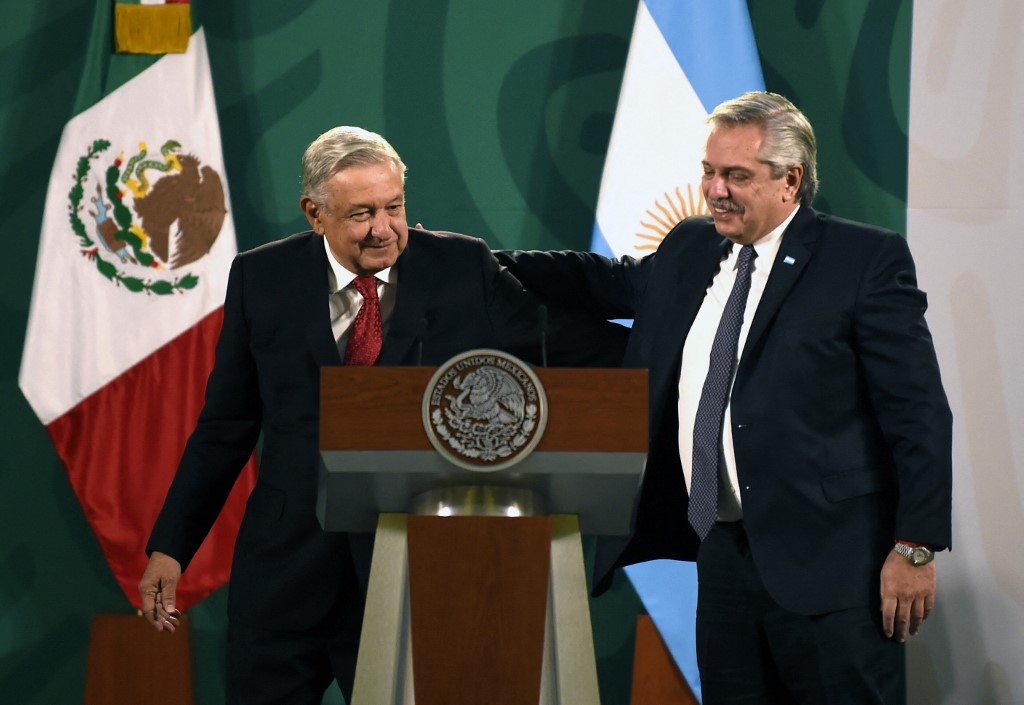RIO DE JANEIRO, BRAZIL – The void left by Brazil, which gave up its regional leadership mainly under the government of Jair Bolsonaro, is making room for the rise of new players in Latin America.
Two presidents are looking to coordinate in order to fill this role, Alberto Fernández and Andrés Manuel López Obrador, a goal that became clear during the Argentine president’s visit to Mexico this week. The two left-wing leaders’ domestic issues, which have caused their approval ratings to plunge during the coronavirus pandemic, do not seem to be hindering their plans. However, assuming a leadership position in the region is a difficult goal to achieve in the current context, according to analysts.

The three-day visit – Fernández is the first Argentine president in a decade to visit Mexico – revealed the ideological affinities and leadership plans of the two politicians. López Obrador recalled that “Mexico and Argentina are partner nations,” while Fernández promised “a new plan to pull millions of Latin Americans out of poverty.” Fernández had already been focusing on other partners, such as Bolivia, which elected Evo Morales’ candidate Luis Arce to the presidency last year; and possibly Ecuador, where an ally of Rafael Correa, Andrés Arauz, has a good chance of winning a runoff election on April 11th.
“Argentina has always had a regional agenda, particularly during the Peronist governments. Now, Fernández has a presence not only with like-minded governments, but with center-right neighbors with whom he needs to establish relations, such as Chile and Uruguay,” explains Professor Monica Hirst of Argentina’s Di Tella University.
“But at the same time, neither Argentina nor Mexico is in a position, together or separately, to push forward a process of resuming a regional political agenda of greater impact. The absence of Brazil, which is now pursuing a bad neighbor policy that was exacerbated during the pandemic, is creating a void in the region that is very difficult to fill.”
The visit took place against the backdrop of the two countries’ cooperation with AstraZeneca in the production of some 200 million doses of the Covid-19 vaccine, which will be produced in Argentina, packaged in Mexico and sold to countries in the region. Fernández visited the Liomont laboratory where the immunizer will be packaged.
The highlight was the publication on Wednesday of a joint document that includes trade agreements and strategies to tackle the pandemic and restructure the regional economy after the health crisis. “The Covid-19 pandemic has highlighted the importance of keeping Latin America and the Caribbean strong, united and in solidarity, where no country in the region is excluded from universal, fair, equitable and timely access to medicines, vaccines and medical supplies,” the document reads.
On that same day, at an event to announce an alliance “against inequality” in the state of Guerrero, Fernández spoke about the partnership:
“Our duty is for Mexico and Argentina to be united. It is our obligation to face a common future and that this helps Latin America. From the northernmost country to the southernmost, we must be able to trace an axis that unites the whole continent,” said the Argentine president.
However, Professor Paulo Esteves, from the International Relations Institute of PUC-Rio, observes that the two countries together “do not hold the required capacity to lead an effort capable of becoming a hub for vaccine production.”
“Brazil could indeed be manufacturing a higher number of vaccines and eventually lead a regional purchasing process, but it can’t even coordinate actions domestically. As a result, other players in the region, and also from abroad, such as China and Russia, have been playing this role, further deepening their presence in Latin America.”
Esteves does not believe that the Mexican-Argentine partnership could develop into a larger alliance:
“With serious internal crises, Argentina increasingly economically dependent on China, and Mexico tied to the United States, I don’t see how this relationship could deepen. There is a potential to strengthen certain institutions in the region, such as the ECLAC (Economic Commission for Latin America and Caribbean States), of which Mexico is rotating president.”
The latest moves by AMLO, as the Mexican president is known, and the partnership with Fernández, evidence a change in tone from the denialist discourse he had at the beginning of the pandemic, when he was even compared to Bolsonaro. According to Dawisson Belém Lopes, professor of international politics at UFMG (University of Minas Gerais), the partnership in favor of vaccination may effectively help the leaders restore their image.
“Fernández has skillfully used the current context diplomatically to leverage Argentina’s role. AMLO himself, who was a denialist and against the vaccine, has understood the potential political rewards that a broad and quick vaccination of the population can yield, not only for economic recovery, for sectors such as tourism, and for the improvement of social and health conditions, but thinking about a potential re-election. By supporting each other, they can please their populations. In the pandemic context, foreign policy and domestic policy are strictly the same thing.”
Source: O Globo

